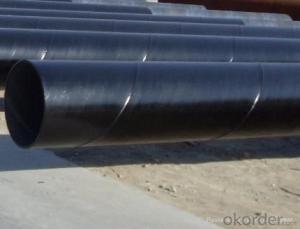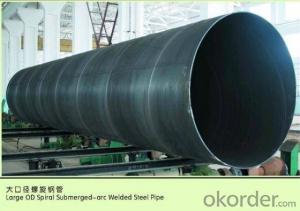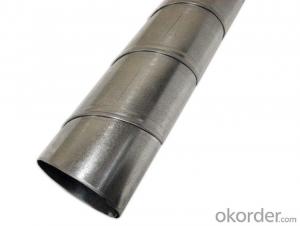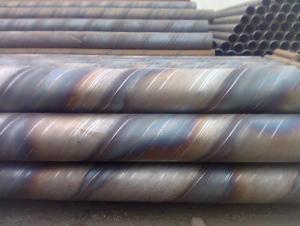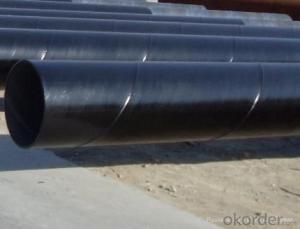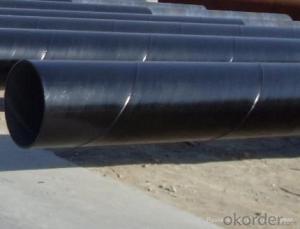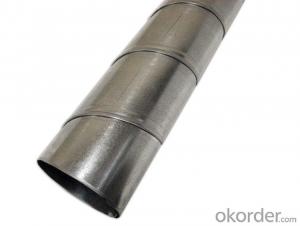SPIRAL STEEL PIPE14‘ 16’‘ 18’‘ 20’‘ 24’’LARGE DIAMETER PIPE
- Loading Port:
- Tianjin
- Payment Terms:
- TT OR LC
- Min Order Qty:
- 5 m.t.
- Supply Capability:
- 3000 m.t./month
OKorder Service Pledge
OKorder Financial Service
You Might Also Like
Packaging & Delivery
Packaging Detail: | standard export packing or as customer's requirement |
Delivery Detail: | within 10 - 30 days |
Specifications
Spiral Welded Steel Pipes and Tubes
1.Material:Q195-Q235
2.Length:1-12m
3.WT:1.0-14mm
4.O.D.:20-273mm
Spiral Welded Steel Pipes and Tubes
Product Description:
1.Material : Q235,Q345,L245,L290,L360,L415,L450,L485,GrB,X42,46,X52,X56,X60,X65,X70,X80,X100
2,Standard: SY/T5037-2000,GB/T9711-2011,API Spec 5L PSL1/PSL2,ASTM A252\A53,ISO3183,DIN17172,EN10217,JIS G3457,AWWA C200,ASTM A139,ASTM A671,ASTM A672
3.Wall thickness: 3.0mm-30mm
4.Outer diameter: φ168mm-3020mm
5,Length: 5m-12m or as your requirement
6,Corrosion protection standard: DIN30670,DIN30671, AWWAC210, AWWA C203, SY/T0413-2002,SY/T0414-2002
7,Application: Oil, gas, natural gas, water pipe, thermal electricity pipe, steel structure engineering, etc
Q195-q345 Material Steel Pipe's Materials
Elements | Chemical Compsition% | Mechanical Property | ||||||
C% | Mn% | S% | P% | Si% | Yield Point (Mpa) | Tensile Strength(Mpa) | Elongation | |
Q195 | 0.06-0.12 | 0.25-0.50 | <0.050< span=""> | <0.045< span=""> | <0.030< span=""> | >195 | 315-430 | 32-33 |
Q215 | 0.09-0.15 | 0.25-0.55 | <0.05< span=""> | <0.045< span=""> | <0.030< span=""> | >215 | 335-450 | 26-31 |
Q235 | 0.12-0.20 | 0.30-0.70 | <0.045< span=""> | <0.045< span=""> | <0.030< span=""> | >235 | 375-500 | 24-26 |
Q345 | <0.20< span=""> | 1.0-1.6 | <0.040< span=""> | <0.040< span=""> | <0.55< span=""> | >345 | 470-630 | 21-22 |
- Q: Can steel pipes be used in plumbing systems?
- Yes, steel pipes can be used in plumbing systems. Steel pipes are commonly used for plumbing installations due to their durability, strength, and resistance to corrosion. They are often preferred for larger water supply lines and can handle high pressure and temperature conditions. However, steel pipes require proper insulation to prevent heat loss and are typically more expensive than alternative materials like PVC or copper pipes.
- Q: How are steel pipes coated for protection?
- Steel pipes are commonly coated for protection through a process called galvanization. This involves immersing the pipes in a bath of molten zinc, creating a protective layer that prevents corrosion and extends their lifespan. Additionally, other methods such as epoxy coatings or polyethylene wrappings can be used to provide additional protection against external factors.
- Q: What are the common methods for repairing steel pipes?
- Some common methods for repairing steel pipes include welding, pipe wrapping, pipe relining, and pipe bursting.
- Q: How long is the seamless tube?
- Welded pipe is generally 6912 meters fixed length, seamless pipe on the market in general non fixed foot, but usually more than 6 meters
- Q: Difference between cold rolled steel pipe and common steel pipe
- 3, the caliber of cold-rolled steel tube is smaller than that of hot rolled steel tube4, from the price point of view, cold-rolled steel pipe is 1000-2000 tons more expensive than hot-rolled steel pipe
- Q: Can steel pipes be used for transporting drinking water?
- Yes, steel pipes can be used for transporting drinking water. Steel pipes are commonly used in water distribution systems and have been used for many years. They are known for their durability, strength, and resistance to corrosion. However, it is important to ensure that the steel pipes used for transporting drinking water are properly coated or lined to prevent any potential contamination from the metal. Additionally, regular inspections and maintenance should be carried out to ensure the integrity of the pipes and to prevent any leaks or breaks that could compromise the quality of the water.
- Q: Can steel pipes be used for natural gas processing plants?
- Yes, steel pipes can be used for natural gas processing plants. Steel pipes have excellent strength and durability, making them suitable for transporting and processing natural gas. They can withstand high-pressure conditions and are resistant to corrosion, providing a safe and reliable option for gas processing facilities.
- Q: What are the different types of joints used in steel pipes?
- There are several types of joints commonly used in steel pipes, including threaded joints, welded joints, flanged joints, and grooved joints.
- Q: Can steel pipes be recycled after their useful life?
- Steel pipes can indeed be recycled once they have served their purpose. Steel, being an incredibly recyclable substance, can be recycled even in the form of pipes. The recycling of steel pipes entails the collection of used pipes, followed by thorough cleaning to eliminate any impurities, and finally transforming them into fresh steel products. This recycling process contributes to the preservation of natural resources, curbs energy usage, and limits waste generation. Moreover, recycling steel pipes aids in mitigating the environmental repercussions linked to the manufacturing of new steel.
- Q: How are steel pipes used in the construction of railway tracks?
- Steel pipes are commonly used in the construction of railway tracks as they provide a strong and durable foundation. These pipes are usually used as support structures for the tracks, serving as a base on which the rails are laid. They help to distribute the weight of the trains evenly, ensuring stability and reducing the risk of track failure. Additionally, steel pipes are used for drainage purposes, allowing water to flow freely and preventing damage to the tracks.
Send your message to us
SPIRAL STEEL PIPE14‘ 16’‘ 18’‘ 20’‘ 24’’LARGE DIAMETER PIPE
- Loading Port:
- Tianjin
- Payment Terms:
- TT OR LC
- Min Order Qty:
- 5 m.t.
- Supply Capability:
- 3000 m.t./month
OKorder Service Pledge
OKorder Financial Service
Similar products
Hot products
Hot Searches
Related keywords
